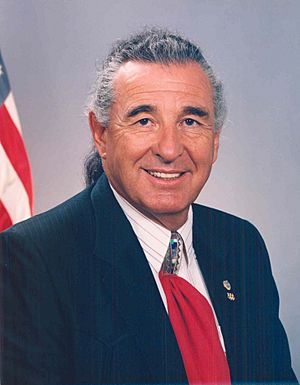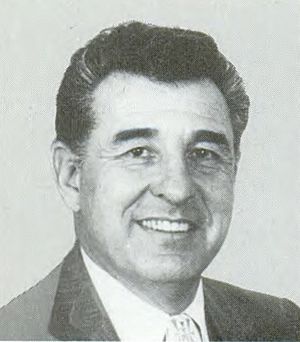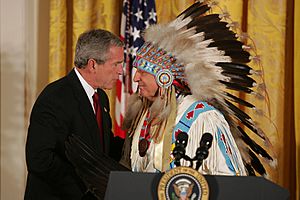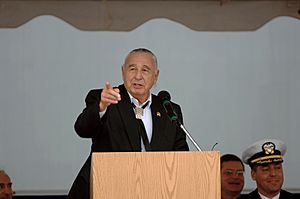Ben Nighthorse Campbell facts for kids
Quick facts for kids
Ben Nighthorse Campbell
|
||||||||||||||
|---|---|---|---|---|---|---|---|---|---|---|---|---|---|---|

Official portrait, c. 1997
|
||||||||||||||
| Chair of the Senate Indian Affairs Committee | ||||||||||||||
| In office January 3, 2003 – January 3, 2005 |
||||||||||||||
| Preceded by | Daniel Inouye | |||||||||||||
| Succeeded by | John McCain | |||||||||||||
| In office January 20, 2001 – June 6, 2001 |
||||||||||||||
| Preceded by | Daniel Inouye | |||||||||||||
| Succeeded by | Daniel Inouye | |||||||||||||
| In office January 3, 1997 – January 3, 2001 |
||||||||||||||
| Preceded by | John McCain | |||||||||||||
| Succeeded by | Daniel Inouye | |||||||||||||
| United States Senator from Colorado |
||||||||||||||
| In office January 3, 1993 – January 3, 2005 |
||||||||||||||
| Preceded by | Tim Wirth | |||||||||||||
| Succeeded by | Ken Salazar | |||||||||||||
| Member of the U.S. House of Representatives from Colorado's 3rd district |
||||||||||||||
| In office January 3, 1987 – January 3, 1993 |
||||||||||||||
| Preceded by | Michael Strang | |||||||||||||
| Succeeded by | Scott McInnis | |||||||||||||
| Member of the Colorado House of Representatives from the 59th district |
||||||||||||||
| In office January 1983 – January 1987 |
||||||||||||||
| Preceded by | Robert E. DeNier | |||||||||||||
| Succeeded by | Jim Dyer | |||||||||||||
| Personal details | ||||||||||||||
| Born |
Benny Marshall Campbell
April 13, 1933 Auburn, California, U.S. |
|||||||||||||
| Died | December 30, 2025 (aged 92) Colorado, U.S. |
|||||||||||||
| Nationality | American Northern Cheyenne |
|||||||||||||
| Political party | Republican (1995–2025) | |||||||||||||
| Other political affiliations |
Democratic (before 1995) | |||||||||||||
| Spouse |
Linda Price
(m. 1966) |
|||||||||||||
| Children | 2 | |||||||||||||
| Education | San Jose State University (BA) Meiji University |
|||||||||||||
| Military service | ||||||||||||||
| Branch | United States Air Force | |||||||||||||
| Service years | 1951–1953 | |||||||||||||
| Rank | Airman First Class E-4 | |||||||||||||
| Conflict | Korean War | |||||||||||||
| Awards | Korean Service Medal Air Medal |
|||||||||||||
|
Medal record
|
||||||||||||||
Ben Nighthorse Campbell (born Benny Marshall Campbell; April 13, 1933 – December 30, 2025) was an important American leader. He was a member of the Northern Cheyenne tribe and served in the United States Air Force. Later, he became a politician, representing Colorado in both the U.S. House of Representatives and the U.S. Senate. He was a special voice in Congress as the only Native American serving there for a time. He also served on the Council of Chiefs for the Northern Cheyenne Indian Tribe.
Contents
Early life
Campbell was born in Auburn, California, on April 13, 1933. His mother, Mary Vierra, was an immigrant from Portugal. His father, Albert Campbell, was of Northern Cheyenne descent. During Ben's childhood, his father faced personal challenges, and his mother had a serious illness that required her to be in the hospital often. Because of these difficulties, Ben and his sister spent parts of their early lives in Catholic orphanages. As a young man, Ben learned the Japanese martial art of judo from Japanese families he met while working in farm fields.
Military service and education
Campbell went to Placer High School but left in 1951 to join the United States Air Force. He served in Korea during the Korean War as an air policeman. He left the Air Force in 1953 as an Airman Second Class, earning the Korean Service Medal and the Air Medal. While in the Air Force, Campbell earned his GED (a high school equivalency diploma). After his service, he used the G.I. Bill to attend San Jose State University, where he graduated in 1957 with a degree in physical education and fine arts. He received the name "Nighthorse" during a special ceremony on the Northern Cheyenne reservation, honoring his father's family.
Career
Sports achievements
In college, Campbell was part of the San Jose State judo team. He trained in Japan at Meiji University from 1960 to 1964. This training helped him win U.S. National judo titles in 1961, 1962, and 1963. He also won a gold medal at the 1963 Pan-American Games. In 1964, Campbell competed in judo at the 1964 Summer Olympics in Tokyo, becoming the first Native American on the U.S. Olympic judo team. He suffered an injury and did not win a medal. After the Olympics, Campbell worked as a deputy sheriff and coached the U.S. national judo team. He also ran his own judo school and taught high school. He and his wife also raised special horses called quarterhorses.
Jewelry making
Before becoming a politician, Campbell was a talented jewelry maker. He learned to make jewelry from his father. He used unique methods, even learning from sword makers in Japan. He won over 200 national and international awards for his jewelry designs, which he created under the name Ben Nighthorse. His work was featured in magazines and is displayed with the Art of the Olympians organization.
Political journey
Campbell began his political career in the Colorado State Legislature as a Democrat in 1982, serving two terms. His colleagues recognized him as one of the top legislators.
Serving in Congress
In 1986, Campbell was elected to the U.S. House of Representatives for Colorado. He was reelected twice. In 1989, he wrote the bill that created the National Museum of the American Indian, an important museum dedicated to Native American history and culture.
Becoming a Senator
In 1992, Campbell was elected to the United States Senate, representing Colorado. He was the first Native American elected to the U.S. Senate since the 1920s. In 1995, he changed his political party from Democrat to Republican. He explained that he made this change because he strongly believed in a balanced-budget amendment, which he had supported since he first came to Washington.
In 1998, Campbell was reelected to the Senate by a large number of votes. During his time in the Senate, he became the first American Indian to lead the Senate Indian Affairs Committee. This committee works on issues important to Native American tribes. Campbell decided not to run for reelection in 2004 due to health concerns. He retired from office in January 2005. He later said he wanted to enjoy his life outside of politics.
After Congress
After retiring, Campbell continued to be involved in public life. He worked as an advisor for a law firm and later started his own consulting firm. He also kept designing and making his unique Ben Nighthorse line of Native American jewelry. Lake Nighthorse, a large reservoir in Colorado, was named in his honor in 2011. In 2016, he shared that he had some regrets about his vote on the Iraq War, wishing he had known more information at the time.
Personal life and passing
In 1966, Ben Campbell married Linda Price, a school teacher from Colorado. They had two children and four grandchildren. Linda Campbell was the sponsor of the USS Mesa Verde (LPD 19), a U.S. Navy ship. Ben Nighthorse Campbell passed away at his ranch in Colorado on December 30, 2025, at the age of 92.
Honors
 Grand-Officer of the Order of Prince Henry, Portugal (1 June 1998)
Grand-Officer of the Order of Prince Henry, Portugal (1 June 1998)- 2008: Awarded the Ellis Island Medal of Freedom.
- 2011: Received the Order of the Rising Sun, Gold Rays with Neck Ribbon from Japanese Emperor Akihito. This award recognized his efforts to improve understanding between Japan and the United States.
- November 2021: Inducted into the National Native American Hall of Fame in Oklahoma City, OK.
Images for kids
-
Campbell, with Chickasaw Congressman Tom Cole and other officials, listening to a speech by then-President Barack Obama (December 2010).
-
Retired Senator Ben Nighthorse Campbell, with his daughter Shanan Campbell Wells, visiting the Santa Fe Indian Market in August 2015.
See also
 In Spanish: Ben Nighthorse Campbell para niños
In Spanish: Ben Nighthorse Campbell para niños
- List of American politicians who switched parties in office
- List of Native American artists
- List of Native Americans in the United States Congress
- List of Native American politicians
- Native American jewelry
- List of United States senators who switched parties
 | Delilah Pierce |
 | Gordon Parks |
 | Augusta Savage |
 | Charles Ethan Porter |






